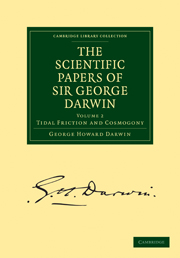Book contents
- Frontmatter
- PREFACE
- Contents
- Chronological List of Papers with References to the Volumes in which they are or probably will be contained
- Erratum in Vol. I
- TIDAL FRICTION AND COSMOGONY
- 1 On the Bodily Tides of Viscous and Semi-elastic Spheroids, and on the Ocean Tides upon a Yielding Nucleus
- 2 Note on Thomson's Theory of the Tides of an Elastic Sphere
- 3 On the Precession of a Viscous Spheroid, and on the Remote History of the Earth
- 4 Problems connected with the Tides of a Viscous Spheroid
- 5 The Determination of the Secular Effects of Tidal Friction by a Graphical Method
- 6 On the Secular Changes in the Elements of the Orbit of a Satellite revolving about a Tidally Distorted Planet
- 7 On the Analytical Expressions which give the History of a Fluid Planet of Small Viscosity, attended by a Single Satellite
- 8 On the Tidal Friction of a Planet attended by Several Satellites, and on the Evolution of the Solar System
- 9 On the Stresses caused in the Interior of the Earth by the Weight of Continents and Mountains
- INDEX
7 - On the Analytical Expressions which give the History of a Fluid Planet of Small Viscosity, attended by a Single Satellite
Published online by Cambridge University Press: 07 September 2010
- Frontmatter
- PREFACE
- Contents
- Chronological List of Papers with References to the Volumes in which they are or probably will be contained
- Erratum in Vol. I
- TIDAL FRICTION AND COSMOGONY
- 1 On the Bodily Tides of Viscous and Semi-elastic Spheroids, and on the Ocean Tides upon a Yielding Nucleus
- 2 Note on Thomson's Theory of the Tides of an Elastic Sphere
- 3 On the Precession of a Viscous Spheroid, and on the Remote History of the Earth
- 4 Problems connected with the Tides of a Viscous Spheroid
- 5 The Determination of the Secular Effects of Tidal Friction by a Graphical Method
- 6 On the Secular Changes in the Elements of the Orbit of a Satellite revolving about a Tidally Distorted Planet
- 7 On the Analytical Expressions which give the History of a Fluid Planet of Small Viscosity, attended by a Single Satellite
- 8 On the Tidal Friction of a Planet attended by Several Satellites, and on the Evolution of the Solar System
- 9 On the Stresses caused in the Interior of the Earth by the Weight of Continents and Mountains
- INDEX
Summary
In a series of papers read from time to time during the past two years before the Royal Society, I have investigated the theory of the tides raised in a rotating viscous spheroid, or planet, by an attendant satellite, and have also considered the secular changes in the rotation of the planet, and in the revolution of the satellite. Those investigations were intended to be especially applicable to the case of the earth and moon, but the friction of the solar tides was found to be a factor of importance, so that in a large part of those papers it became necessary to conceive the planet as attended by two satellites.
The differential equations which gave the secular changes in the system were rendered very complex by the introduction of solar disturbance, and I was unable to integrate them analytically; the equations were accordingly treated by a method of numerical quadratures, in which all the data were taken from the earth, moon, and sun. This numerical treatment did not permit an insight into all the various effects which might result from frictional tides, and an analytical solution, applicable to any planet and satellite, is desirable.
In the present paper such an analytical solution is found, and is interpreted graphically. But the problem is considered from a point of view which is at once more special and more general than that of the previous papers.
- Type
- Chapter
- Information
- The Scientific Papers of Sir George DarwinTidal Friction and Cosmogony, pp. 383 - 405Publisher: Cambridge University PressPrint publication year: 2009First published in: 1908



